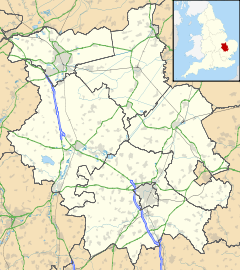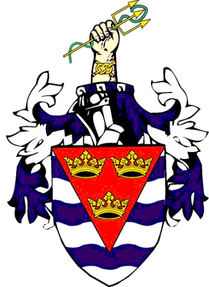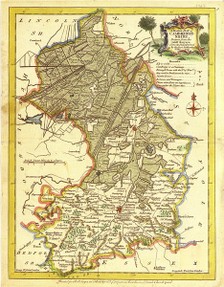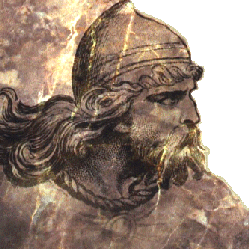The Wake
Outlaw - Rebel - Hero
 Hereward the Wake known in his own times as both Hereward the Outlaw, and Hereward the Exile, was an 11th century leader of local resistance to the Norman conquest of England.
Hereward the Wake known in his own times as both Hereward the Outlaw, and Hereward the Exile, was an 11th century leader of local resistance to the Norman conquest of England.
The Domesday Book reveals Hereward to be a hero as real and actual as any since, who held lands in the parishes of Witham on the Hill and Barholm with Stow, in the south-western corner of Lincolnshire, as a tenant of Peterborough Abbey.
His birth place seems by all accounts to have been in or near Bourne in Lincolnshire.
The title "the Wake" (meaning "watcher") was popularly assigned to him many years after his death.
An unruly youth, Hereward was declared an outlaw by Edward the Confessor, at the age of eighteen for disobedience to his father and for disruptive behaviour, forcing him into exile in Europe where he became a Mercenary.
Returning to England and discovering the death by Norman hand of his family and confiscation of the family land, Hereward’s life as a rebel began in earnest.
The Isle Of Ely
A Rebel Base
 In 1069 or 1070 the Danish king Sweyn Estrithson established a camp on the Isle of Ely. Here he was joined by many, including Hereward.
In 1069 or 1070 the Danish king Sweyn Estrithson established a camp on the Isle of Ely. Here he was joined by many, including Hereward.
Their first act was to storm and sack Peterborough Abbey in 1070, in the company of local men. Hereward’s justification is said to have been that he wished to save the Abbey's treasures and relics from the Normans.
It was the arrival of the rebellious Earl Morcar on Ely that escalated this local problem into a national one.
William could not afford to let such a high-profile rebel remain at large, and despatched a fleet and army to besiege the rebels in the marsh.
The Normans built a mile long causeway over the marsh seven miles south of Ely at a place called Aldreth Causeway.
The Defence Of Ely
Surrender To The Normans
 In the following year of 1071, Hereward and many others made a desperate stand on the Isle of Ely.
In the following year of 1071, Hereward and many others made a desperate stand on the Isle of Ely.
The Normans made a frontal assault, aided by the timber causeway which sank under the weight of armour and horses. It is said that eventually, the Normans then bribed the monks of the island to reveal a safe route across the marshes, resulting in Ely being over-run and captured.
Although finally forced to yield to the Normans, Hereward thus came to stand for the bravery of a defeated Saxon race, his name being passed down as that of the enduring hero for his splendid stubborn defence of Ely.
The Saxons forgave his final heroic loss to Duke William, and attributed to him all the virtues supposed to be inherent in the free-born, and all the glorious valour on which the English prided themselves.
.
Hereward After The Fall Of Ely
What Became Of Hereward The Wake?
 There are conflicting accounts about Hereward's life after the fall of Ely.
There are conflicting accounts about Hereward's life after the fall of Ely.
Hereward is said to have escaped with some of his followers into the wild fenland, and to have continued his resistance.
The 12th century Gesta Herewardi, states Hereward was eventually pardoned by William and lived the rest of his life in relative peace.
Some sources say that Hereward lived for some time in the Fens, but as he was on the verge of making peace with William, he was set upon and killed by a group of Norman knights.
A strong possibility is that Hereward received no such pardon and went into exile never to be heard from again, as this was the fate of a lot of prominent Englishmen after the Conquest .
England was to remain under the yoke of the Norman Barons, the land divided between them, never again to be relinquished even to this day.
1066 changed the lives of the conquered people forever.
Hereward Way is a long-distance footpath in England. The path takes its name from Hereward the Wake, the 11th century leader who had his base on the Isle of Ely, located near to the middle of the path.
It would be nice to think that the spirit of Hereward the Wake still roams the land.
Did You Already Know About Hereward The Wake?
 |
| Hereward The Wake - Last of The English Young Press Only $34.99 |
 |
| THE DEATH OF HEREWARD - Canvas - Medium - 30x45cm Mary Evans Picture Library Only $69.00 |
You might also like
Magic of King TutankhamunA tabloid article I wrote about the magic of King Tutankhamun during the Egyp...
Thinking about NalediThe new discoveries in the Rising Star cave in South Africa arouse questions ...





 The Life Of Hubert Wilkinson 06/06/2011
The Life Of Hubert Wilkinson 06/06/2011


Comments